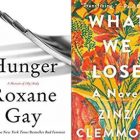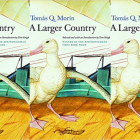Conjure by Rae Armantrout

Conjure
Rae Armantrout
Wesleyan University Press | September 8, 2020
“I’m a chimera / factory”—the last lines of the poem “Can You See”—is an apt description of Conjure, a new book of poems by multiple award-winning poet Rae Armantrout. The collection is a superbly crafted shapeshifter, a distinctive discourse that dislocates traditional linguistic patterns and conventional wisdom. Armantrout’s poems masterfully reflect the time in which they were written—true also in her collection Money Shot (2011), which explored “disaster capitalism,” and is as resonant today as it was then—and as a result, never expire, existing in continual conversation with each other and with us.
A fascinated witness of how we interact, Armantrout’s poems are layered and gorgeously surprising. Through her specificity, we consider how often language is brandished thoughtlessly, and how dangerous such generalities can be. Written before the pandemic and the ensuing financial crisis (and, at this writing, hurricanes, massive fires, power outages, and more), she says: “There are masks / in offices. // Machines run the banks / and the power company.” Armantrout offers an unexpected and startling layer of recognition. Masks are what we show to the public, what we hide from others (and ourselves), and, now, how we protect ourselves and, in some cases, resist. Combined with the supplanting of personal contact with electronics and the flawed impersonality of said machinery, this is but one instance of Armantrout the poet as seer as well as social commentator. It is also an example of how Armantrout’s subtle and singular language and style both anchors the poem in its era and engenders a timelessness that endures.
Likewise, in Conjure, consciousness, along with a contemplation of our motivations and expectations, is an enduring theme. Armantrout is fascinated by the “eye” and “I”—the gaze as well as the subjective experience. In the poem “Care,” for example, Armantrout explores the act of being self-conscious—a concept different from being conscious of the self. Self-consciousness is a form of looking outward, of judging the self in an environment, whereas consciousness of the self is an inward process; Armantrout questions whether being self-conscious is a good thing or a source of deep dissatisfaction:
A fish taps a clam
against a bony knob
of coral
to crack its shell—
which demonstrates intelligence
yes, but
is the fish
pleased with itself?
Here, the reader questions whether the fish feels self-satisfaction in its abilities, which demonstrate its consciousness, or if feeding itself, i.e. its survival, is the fish’s sole goal. Does that secondary hunger, the need for approbation, make human beings superior? Or does it imprison us in ways far beyond the boundaries of our marine protagonist? As in all of her poems, Armantrout leaves such questions open to interpretation.
Armantrout’s poetry is also seamless, even with the diversity of the stanzaic “rooms” she creates. The seeming effortlessness of the final product belies the expertise and assuredness behind the curtain; much like the sensitivity a master chef employs, balancing a rare spice in a dish just so. Armantrout has always been this kind of thoughtful poet, one who delights in contemplations and collocations, as well as the systems—biological, scientific, economic, and of course, linguistic—that direct our lives, as seen in the poem “Philosophical Investigations”:
I’m interested in the way
interest
creates finitude
~
Differently translated,
’in choosing itself,
existing being
closes a circuit.
Here, Armantrout presents the conundrum of life: our choices constrain outcomes; but the alternative, to select nothing, to remain in potentiality, isn’t viable for a living organism, and is the antithesis of evolution and forward motion. Armantrout’s poetics often occupy this sliver of space between finitude and limitlessness. Known for the specificity of her language, her work is about possibilities: the permutations of objects and verbs and ideas that are less like pieces of a puzzle than collages of such systems to allow us to understand our world and ourselves. In “Clip Art,” she writes:
I’m drawing
mirror image arcs
in the baby’s brain—
closed parentheses
left hanging.
Armantrout proceeds to not close parentheses in several lines throughout the collection. This is one of the ways she uses form as accumulation, as well as subtle, yet radical subversion. She suggests our lives are parenthetical equations, with a closing that we don’t select, or often even see coming.
Conjure, however, isn’t a somber collection: beyond scientific inquiries, philosophical investigations, and broader cultural commentary, there’s an elemental playfulness—both a counterbalance to our disordered world, as well as an expression of the poet’s own sense of humor—amidst the incisive text, here sharpened by the exclamation points that skewer superficial societal edicts: “Dress like you care!” she writes. “Eat like you care! / Care like you care!” Later, she comments on how technology can interject into our lives so absurdly, worthy of an Ionesco moment: “My screen claims / I have ‘new memories.’”
At its core, Conjure is a collection of ever-deepening excavations of ourselves and our world, all founded on linguistic delight and precision, as well as an enduring sense of wonder. The word “conjure” typically suggests a summoning, an incantation, though the Latin roots are more related to a “swearing together,” an oath, which suggests a sacred commitment: of the writer to the reader, of the individual to her craft. In the title poem, the speaker—possibly a stand-in for the poet—offers her intent for this collection, perhaps for her lifetime of poetics, and what is still to come:
All I want
is not to be
first on one side,
then the other,
but to conjure
a stream
of sounds and images
for which I am not
responsible.
and maneuver within it—
The ironic wink is that Rae Armantrout is responsible for this dance, this spell-making, this deft and graceful maneuvering through the possibilities and power of words, and of the human experience. Conjure offers a magic of its own, with sometimes sly and always unforgettable juxtapositions of the minute and the exceptional, elevated by the intellect, flair, and confidence of a poet at the top of her game.



